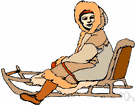In·u·it
(ĭn′o͞o-ĭt, -yo͞o-)n.
1. (used with a pl. verb) The members of various Eskimoan peoples inhabiting the Arctic from northwest Alaska eastward to eastern Greenland, particularly those inhabiting Canada.
2.
a. The family of languages spoken by the Inuit.
b. Any of the languages spoken by the Inuit.
adj.
Of or relating to the Inuit or the languages spoken by the Inuit.
[Inuit, pl. of inuk, human being, Eskimo.]
Usage Note: The preferred term for the native peoples of the Canadian Arctic and Greenland is now Inuit, and the use of Eskimo in referring to these peoples is often considered offensive, especially in Canada. Inuit is inappropriate, however, when used in reference to speakers of Yupik, the Eskimoan language branch of southwest Alaska and the Siberian Arctic. See Usage Note at Eskimo.
American Heritage® Dictionary of the English Language, Fifth Edition. Copyright © 2016 by Houghton Mifflin Harcourt Publishing Company. Published by Houghton Mifflin Harcourt Publishing Company. All rights reserved.
Inuit
(ˈɪnjuːɪt) orInnuit
n, pl -it or -its
1. (Peoples) any of several Native peoples of N America or Greenland, as distinguished from those from Asia or the Aleutian Islands (who are still generally referred to as Eskimos); the preferred term for Eskimo in N America. Compare Yupik
2. (Languages) the language of these peoples; Inuktitut
[from Inuktitut inuit the people, pl of inuk a man]
Usage: See at Eskimo
Collins English Dictionary – Complete and Unabridged, 12th Edition 2014 © HarperCollins Publishers 1991, 1994, 1998, 2000, 2003, 2006, 2007, 2009, 2011, 2014
In•u•it
or In•nu•it
(ˈɪn u ɪt, -yu-)n., pl. -its, (esp. collectively) -it.
1.
a. a member of any of the Eskimo groups inhabiting an area extending from Greenland to W arctic Canada.
2. Also called In′uit-Inu′piaq. the speech of all the Eskimo groups from Greenland to NW Alaska.
[1755–65; < Inuit: people, pl. of inuk person]
Random House Kernerman Webster's College Dictionary, © 2010 K Dictionaries Ltd. Copyright 2005, 1997, 1991 by Random House, Inc. All rights reserved.
ThesaurusAntonymsRelated WordsSynonymsLegend:
| Noun | 1. |  Inuit - a member of a people inhabiting the Arctic (northern Canada or Greenland or Alaska or eastern Siberia); the Algonquians called them Eskimo (`eaters of raw flesh') but they call themselves the Inuit (`the people') Inuit - a member of a people inhabiting the Arctic (northern Canada or Greenland or Alaska or eastern Siberia); the Algonquians called them Eskimo (`eaters of raw flesh') but they call themselves the Inuit (`the people')American Indian, Indian, Red Indian - a member of the race of people living in America when Europeans arrived |
Based on WordNet 3.0, Farlex clipart collection. © 2003-2012 Princeton University, Farlex Inc.
Translations
Inuk
інуїтиінуїтськаінуїтська моваінуїтський
Collins Spanish Dictionary - Complete and Unabridged 8th Edition 2005 © William Collins Sons & Co. Ltd. 1971, 1988 © HarperCollins Publishers 1992, 1993, 1996, 1997, 2000, 2003, 2005
Collins English/French Electronic Resource. © HarperCollins Publishers 2005